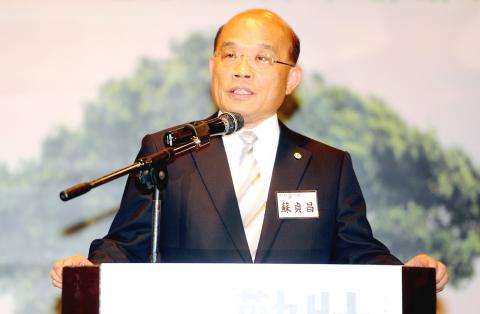|
DPP to start
presidential impeachment
DUTIFUL: The initiative should not be seen as
the DPP supporting Wang Jin-pyng in his struggle with Ma, but as action the main
opposition party must take, the DPP said
By Chris Wang / Staff reporter

Democratic Progressive Party (DPP)
Chairman Su Tseng-chang talks to the press after a party meeting to review the
DPP’s eight years in government yesterday. During his closing address, Su
criticized President Ma Ying-jeou and said that a motion to impeach Ma would be
introduced in the legislature.
Photo: Chang Chia-ming, Taipei Times
The Democratic Progressive Party (DPP)
plans to initiate an impeachment of President Ma Ying-jeou (馬英九) in the
Legislative Yuan, saying Ma’s political vendetta against Legislative Speaker
Wang Jin-pyng (王金平) has jeopardized Taiwan’s constitutional order and political
stability.
DPP Chairman Su Tseng-chang (蘇貞昌) announced the initiative yesterday afternoon
at the closing ceremony of a DPP-organized forum to review the party’s
governance between 2000 and 2008, and called for non-partisan support in the
legislature.
“Ma’s sabotage of the constitutional mechanism — the infringement of legislative
authority and the separation of powers — is a serious concern. With this
impeachment initiative, we want to have Ma face the legislature and explain his
side of the story,” Su said.
The president has called Wang’s alleged illegal lobbying a cardinal sin in a
democratic country and subsequently orchestrated revocation of the senior
politician’s Chinese Nationalist Party (KMT) membership, as well as seeking to
invalidate Wang’s speakership.
Impeachment is one of the four measures that the DPP may initiate to hold Ma
accountable for his actions, the others being asking for a reinterpretation of
the Constitution, recall and a Cabinet motion of no confidence, Su said.
There are several reasons for the initiative as it is necessary for the
legislature to take action against Ma’s infringement of its power, and
impeachment is stipulated by the Constitution as a countermeasure against the
president’s unconstitutional actions, Su said.
Most importantly, according to the Act Governing the Legislative Yuan’s Power
(立法院職權行使法), Ma would have to face the legislature and report to the plenary once
an impeachment initiative passes the threshold and has the signatures of at
least half of the legislators, he said.
Since the opposition only controls 45 seats in the 112-member legislature, at
least 12 votes from KMT lawmakers would be needed to pass the 50 percent
threshold for the initiative to move forward.
Impeachment would then require the support of two-thirds of all legislators
before being sent to the Council of Grand Justices for another round of
discussion and voting, Su said.
“However, despite the difficulty we think this is the right thing to do,” he
added.
The initiative should not be seen as the DPP supporting Wang in his power
struggle with Ma, which, for the DPP, is the KMT’s business, but as an action
the DPP must take as the main opposition party in the wake of Ma’s repeated
unconstitutional political maneuvers, said a DPP aide, who wished to remain
anonymous.
In addition to pursuing impeachment, DPP lawmakers have demanded an
interpretation of the Constitution.
Former vice president Annette Lu (呂秀蓮) yesterday said she would launch a
campaign to recall Ma tomorrow with the establishment of a citizens’ alliance.
Speaking to the media on the sidelines of the DPP forum, Lu said she was
launching the campaign because “Ma had pushed Taiwan to the brink of
authoritarian rule and his actions have come to the point where they are almost
unbearable.”
According to the Presidential and Vice Presidential Election and Recall Act
(總統副總統選舉罷免法), the recall of the president must first be nominated by one-fourth
of all legislators, then ratified by two-thirds of all legislators before the
legislature may ratify recall proposal.
The law also states that a successful recall requires 50 percent voter support
for the motion and a turnout of more than 50 percent of registered voters.
|
![]()
![]()
![]()